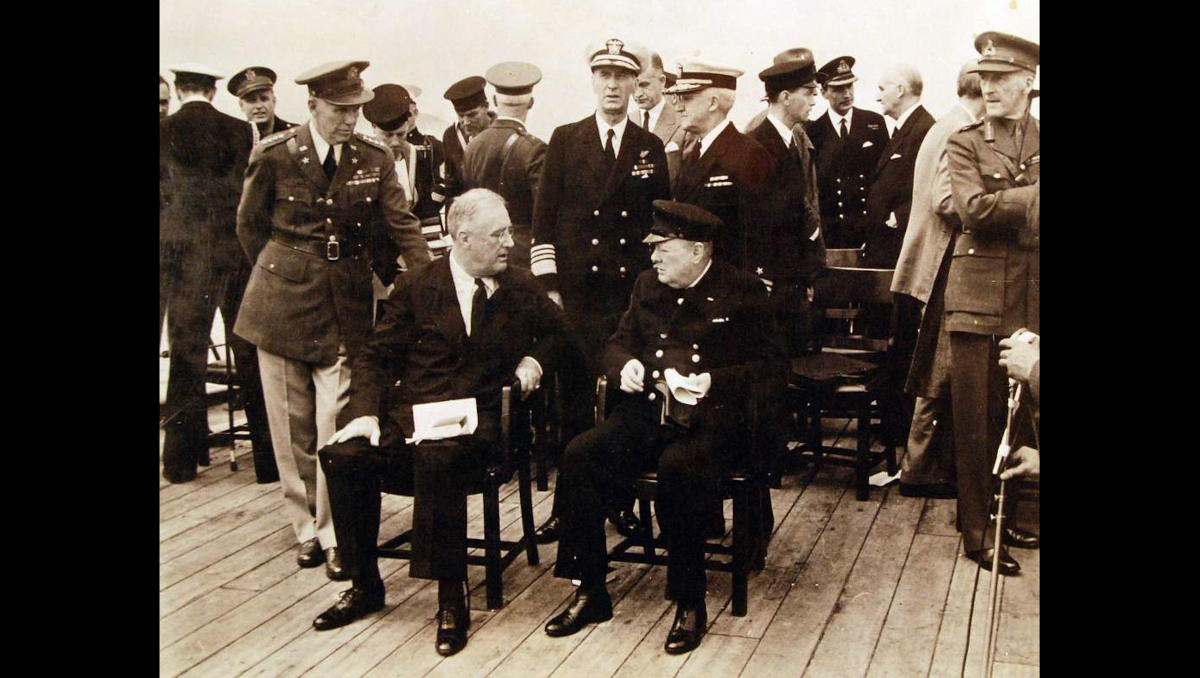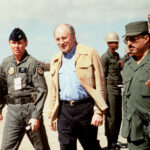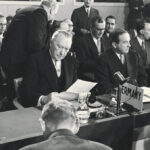
It’s the time of the year when we feature some of the smart conversations that occur around the country through the Eisenhower Series College Program. This episode features Erik Sarson and Anna Scott as they examine the strength and importance of allies and partners. Erik is an Army Special Forces officer in the West Virginia National Guard, and he shared insights from his experience with the State Partnership Program. Anna is a British Army officer, and she speaks about the “special relationship” between the UK and the U.S., highlighting the significance of soft power and shared values. They join host Ron Granieri to highlight the positive reception from their audiences, noting a general understanding and curiosity about the future of alliances, even when addressing potential disagreements.
And so disagreement, I think, is really healthy. And I also just think it’s okay to say, “Of course we’re the best of friends, but we can pursue our own national interests in a unilateral way, should we need to, and should we wish to, and should it be in our own strategic benefits to do so”.
Podcast: Download
Subscribe: Apple Podcasts | Spotify | Amazon Music | Android | Pandora | iHeartRadio | Blubrry | Podchaser | Podcast Index | TuneIn | Deezer | Youtube Music | RSS | Subscribe to A Better Peace: The War Room Podcast
Erik Sarson is an Army Special Forces lieutenant colonel in the West Virginia National Guard. He spent the last five years of his career as a Bilateral Affairs Officer at U.S. Embassy Qatar and then as the State Partnership Program Director for West Virginia, which is partnered with Peru, Qatar, and Gabon. He is a graduate of the AY25 Resident Course at the U.S. Army War College.
Anna Scott is a British Army colonel who was commissioned into the Royal Engineers in 2003. She has held strategy positions in the Army Headquarters and UK Ministry of Defence, and deployed recently in support of NATO missions in Eastern Europe. She is assigned next to the Pentagon as the Special Assistant to the Chief of Staff of the U.S Army. She is a graduate of the AY25 Resident Course at the U.S. Army War College.
Ron Granieri is Professor of History and the Chair of the Department of National Security and Strategy at the U.S. Army War College and the Editor of A BETTER PEACE.
The views expressed in this presentation are those of the speakers and do not necessarily reflect those of the U.S. Army War College, U.S. Army, or Department of Defense.
Photo Description: Atlantic Charter, August 1941. Informal group on deck of Royal Navy King George V battleship Prince of Wales following church services, during the Atlantic Charter meeting. Standing behind President Franklin D. Roosevelt and Prime Minister Winston S. Churchill are General George C. Marshall, Admiral Ernest J. King, Admiral Harold R. Stark and General Sir John Dill. Photograph released August 10, 1941.
Photo Credit: Official U.S. Navy Photograph, now in the collections of the National Archives.





From the written introduction to our podcast above:
“Anna is a British Army officer, and she speaks about the ‘special relationship’ between the UK and the U.S., highlighting the significance of soft power and shared values.”
But:
a. Does the U.S. (and the UK?), today, have anywhere near the “soft power,” that it (they) had in the recent past?
b. Does the U.S., today, have anywhere near the same “shared values,” that it had with the UK, in the recent past? And:
c. Are my “a” and “b” above something that COL Scott could, and indeed did, share and discuss with the students that she interacted with?
Re: my initial comment above, should we consider that — regarding some of the attributes that used to form the basis for America’s amazing “soft power:”
(From AI: “America’s soft power, the ability to influence others through attraction rather than coercion, is primarily based on its culture, political ideals, and policies. This includes the appeal of American values like democracy, human rights, and individual opportunity, along with popular culture, educational institutions, and its civil society”)
As to these such attributes and others, are they not now often being seen, by many/most Americans, as being more of a liability/as being more of a burden/as being something that prevents their group(s) from achieving their goals; this, rather than as essential and desirable assets that, today as in the past, (a) must be preserved and, thus, (b) are worth fighting for?
(Thus, as to “allies and influence,” etc., these such changes — which may have/have dramatically effected both America’s “soft power” image and the idea that America has “shared values” with certain other nations — these such changes, for obvious reasons, must be considered today, and must be incorporated into our discussions with students and with other groups today — regarding such topics as “allies and influence?”)
Question, as to alliances, influence, etc.
First, some background:
In the past, a primary concern of the United States, this seems to have been that the states and societies, that the U.S. wished to retain and/or to form alliances with, that these such states and societies should be required to maintain, and/or to transform themselves; this, so as to embrace our long-standing — and thus rather “old” — political, economic, social and value systems, ideas and concepts.
Currently, however, a primary concern of the United States, this seems to be that the states and societies, that the U.S. wishes to retain and/or to form alliances with, that these such states and societies should be required to maintain, and/or transform themselves; this, so as to embrace our — rather new and emerging — political, economic, social and value systems, ideas and concepts.
Now, the seemingly obvious question:
a. In circumstances such as these, are our “old” allies (and, indeed, our old enemies?) likely to remain the same? Or:
b. In circumstances such as these, should we expect that — sooner rather than later — we will have new and different allies and enemies criteria and lists?
(Thus, a possible question for LTC Sarson, for example, re: Peru, Qatar, Gabon, etc.?)
Note that — as to the phenomenon that I describe above — should not this form at least part of the discussion that our Eisenhower Series ambassadors have with the students that they interact with?
In this manner, for example, to introduce to these students some of the difficulties that soldiers and statespersons face — in these changing times?
(And, thus, help to “bridge the gap” — and thus help to improve upon — such things as civil-military relations?)